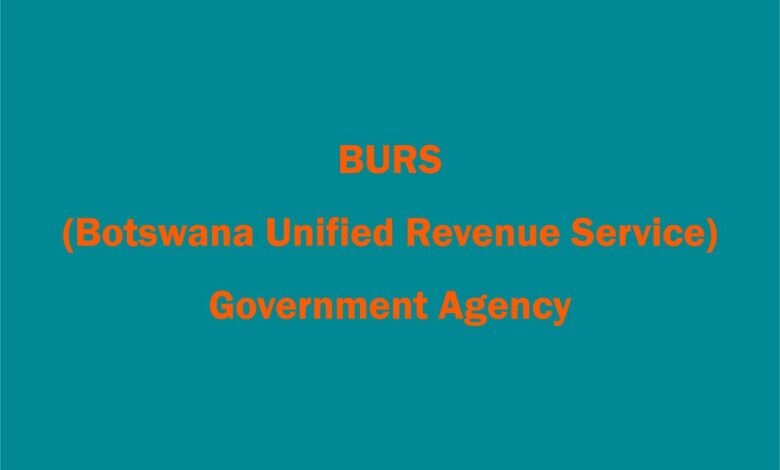BURS (Botswana Unified Revenue Service) Agency

Botswana Unified Revenue Service (BURS) is a key agency in Botswana, responsible for managing and collecting revenues on behalf of the government. Established under the Botswana Unified Revenue Service Act, this agency plays a central role in ensuring the country’s financial health by administering various taxes, customs duties, and excise laws.
What Does BURS Do?
According to him, the taxes and duties to be collected are enabled by BURS; it also maintains data related to tax revenues and accounts for such. These would typically include income tax, Value Added Tax (VAT), customs duties, excise duties, and capital transfer taxes.
Our primary function is to ensure that Botswana Government receives its share of revenue to pay for essential services and national development projects. In addition to tax collection, BUR ensures compliance with tax laws, assists in trade facilitations, and monitors customs operations at national borders.
Key Responsibilities and Tax Categories
The agency administers a variety of taxes, including but not limited to:
Income Tax: Basically any person, entity or partnership trading in Botswana. This PAYE is the largest component of income tax which, ideally, should be deducted from employees’ salaries.
VAT (Value Added Tax or sale taxes): A type of indirect tax and is in some ways similar to a sales tax. Strict timelines are given by BURS, and VAT compliance is made mandatory within that period of time.
Excise Duty: This tax is imposed on all of the identified goods individually, such as alcohol, tobacco, and fuel. Collection and enforcement of these taxes is regulated by BURS itself.
Import and Export of Goods: Botswana Unified Revenue Service regulates and imposes taxes on goods being imported to Botswana or exported from the country. These operations are regulated by the Customs and Excise division according to the Trade Laws.
Modernization and Technology Integration
In the recent years, BURS has done a lot to modernize its operations. The most significant improvement was the move to a Comprehensive Customs Management System (CMS), in order to increase speed at customs clearance procedures.
The System for Integrated Tax Administration strengthened links between BURS and other government agencies by enabling data integration, thereby minimizing duplication of forms or manual capture of data.
In addition, the BURS created mobile applications for informal traders and travelers to pre-declare goods. The move is part of an initiative that reduces the waiting time at border posts to provide flexible and streamlined processes for traders.
BURS and International Collaboration
Botswana Unified Revenue Service is not only the lifeline to Botswana in terms of domestic revenue collection but also a key player in regional trade. BURS, a division of the Ministry of Finance and Development Planning, is based in Botswana.
Botswana is a member of the Customs Union in Southern Africa (SACU) and works closely with its neighboring states such as South Africa and Zambia. The impressive motto “Your export is my import” describes the need for borderless sharing of data with a faster turnaround time to track and balance trade statistics between countries.
Trade Facilitation and Efficiency Improvements
These measures have included reforms by BURS in improving the sooner clearance of cargo and simplifying procedures, part of its mandate to enhance Botswana’s trade efficiency. For example, the Corridor Trip Monitoring System (CTMS) would track trucks at exit/entry points of cross-border truck corridors and harmonize customs clearance activities so that protocols across regions will eventually be implemented consistently.
This is an important system because the Southern Africa Development Community (SADC) protocol allows for transit of cargo through Botswana to Central Africa.
BURS have shown their inclination to minimize risk in revenue and improve customs inspections with the use of data-driven technologies. Using high-tech cargo scanners and centralized data analysis BURS reduced or eliminated the need for time consuming manual inspections, thereby saving time for processing importations at the border points.
Challenges and Future Directions
With its recent modernization drive, BURS has made great strides but it still faces challenges. One of the continued challenges with BURS is system interoperability as much of BURS’s technology cannot talk to other platforms. To solve these tablets, the agency is annually working towards upgrading it systems and work closer across departments as known MEI_ADMIN Management.
On the other hand, BURS also has to manoeuvre through regulatory and legislative amendments, along with technological obstacles. With changes in trade and tax laws, BURS needs to be flexible and ensure that it can implement new rules effectively – especially if international e-commerce is the one on the upswing.
The Bottom Line
BURS is a vital institution in the economy of Botswana that enables Botswana Government to finance public service provision by effectively collecting taxes and managing customs. As efforts continue to modernize and maintain interoperability with data-driven systems, BURS will be able to respond effectively as challenges arise.
Yet wider investment in technology and cross-border partnerships will need to be maintained for success by the agency over the long run. By using sophisticated tools and leveraging efficiency,
BURS is automating internal services while at the same time easing the import/export supply chain. In the long term, as Botswana emerges as a rapidly developing economy, BURS stands prepared to ensure that all financial regulations are adhered to in both a domestic and global context on par with international best practice.




